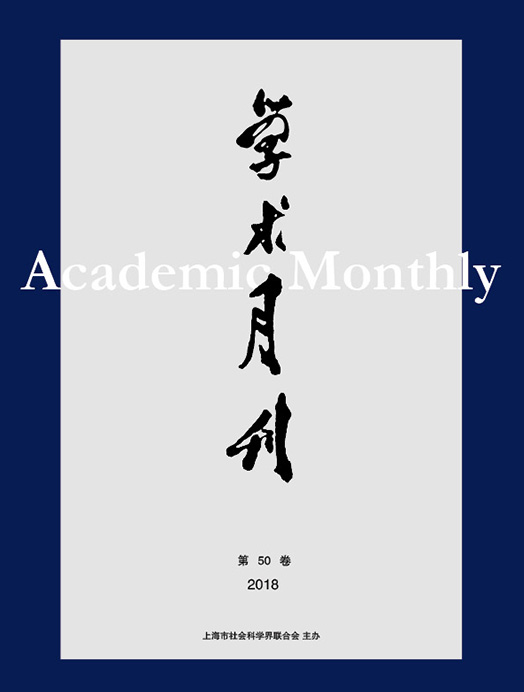Citation:
Bing ZHANG. The Problem of Chinese Philosophy’s Return[J]. Academic Monthly, 2019, 51(2): 17-33.

The Problem of Chinese Philosophy’s Return
-
Abstract
In the most severe sense, the " problem of return” of Chinese philosophy mainly refers to the crisis of the loss of its own meaning within the signifying practice of Western philosophical discourse. Historically, the statement that Chinese philosophy has the flaw of Feng Youlan-Hegel’s insufficient expression, gave rise to the movement of Chinese philosophy’s categorization, which led to the problem of Foucault-Saidian over-expression, namely, the problem of discourse-determinism. Against this background, " the transcendent subject” established by Mou Zongsan with the method of NiJueTiZheng( " 逆觉体证” )can be viewed as a willingful resistance to the Western philosophical discourse, but the deficiency of Mou’s ontological interpretation based on the subjectivity makes his theory serve the Western philosophical discourse practice. With the help of the teachings of the phenomenological reduction and the lesson of Mou Zongsan’s ontology, it can be said that the radical return of Chinese philosophy depends on the manifestation of a kind of aesthetic. Such aesthetic elucidation shows, the root of Chinese philosophy lies in the tacit percieved-world in where body was embedded. In that sense, both Heideggerian Ekstasis/ standing forth and Mo’s standing up should be essentially a bodily standing forth. The ecstacy and recession of body, that is, the intertwined horizon, constituts the foundation of the standing-forth of subjectivity; at the same time, the Chiasm of language and the tacit world, indicated by the bodily ecstatic-recessive chiasm, also dispels the predicament of so-called Chinese philosophy’s insufficient expression.
-

-
References
-
Access
-
-
[1]
LAI Daren
. . Academic Monthly,
2018, 50(6): 104-112.
-
[2]
Zengguang LIU
. “Original Body” and Metaphysical Dimension of Body. Academic Monthly,
2019, 51(5): 24-31.
-
[3]
Weisheng XIAO
. On the Fate and Future of Literary Theory after “the End of Literature”. Academic Monthly,
2020, 52(11): 129-141.
-
[4]
Rong LI
. Roland Barthes and the Language Practice of “the Third Generation Poetry”. Academic Monthly,
2020, 52(10): 130-140.
-
[5]
CHU Xiaobai
. Writing Revenge with the Body —— On the Rewriting of “The Crucifixion” in Lu Xun‘s Revenge (II). Academic Monthly,
2023, 55(9): 152-160.
-
[6]
Zhenhua YU
. Overcoming the Contemplative Tradition: An Examination of Heidegger’s Fundamental Ontology. Academic Monthly,
2018, 50(11): 5-17, 44.
-
[7]
. . Academic Monthly,
2017, 49(07): 25-34.
-
[8]
Qingjie WANG
. Is Heidegger’s Fundamental Ontology A Philosophical Anthropology?. Academic Monthly,
2019, 51(8): 5-12.
-
[9]
Naiqiao YANG
. The Multi-interlingual Translation from “Vernehmen” to “觉知”: On the Deconstruction of the Transcendental Meaning of Metaphysics by Martin Heidegger’s Ontological Hermeneutics. Academic Monthly,
2023, 55(3): 162-176.
-
[10]
. . Academic Monthly,
2016, 48(05): 133-142.
-
[11]
Kangzhi ZHANG
. The Predicament of Emancipation and A New Starting of Historical Choice. Academic Monthly,
2019, 51(9): 70-81.
-
[12]
. . Academic Monthly,
2017, 49(05): 116-127.
-
[13]
JIA Wenjuan
. The Body of Labor, the Mind of Capital——Self Capitalization and the Formation of the Laborers Ideology in Late Neoliberalism. Academic Monthly,
2023, 55(12): 112-121.
-
[14]
Xiaobai CHU
. On the Family-Nation Discourse and Its Symbolic Structure during the Anti-Foreign-Religion Movement in Late Qing Dynasty. Academic Monthly,
2021, 53(3): 146-159.
-
[15]
Daren LAI
, Yuzhou ZHANG
. Discourse Construction of Theory of Chinese Literature Essence: Modern Generation and Contemporary Evolution. Academic Monthly,
2022, 54(11): 160-168, 206.
-
[16]
. . Academic Monthly,
2016, 48(06): 13-23.
-
[17]
Chengfang ZHUO
, Daping HU
. Existence and Speed. Academic Monthly,
2019, 51(10): 22-30.
-
[18]
. . Academic Monthly,
2022, 54(6): 18-23.
-
[19]
Meng HOU
. The Change of Political and Legal Discourse of New China. Academic Monthly,
2020, 52(2): 119-128.
-
[20]
Yongle ZHANG
. The Transoceanic Travelling of the Monroe Doctrine. Academic Monthly,
2020, 52(7): 105-125.
-
-



 沪公网安备 31010102003103号
沪公网安备 31010102003103号 DownLoad:
DownLoad: